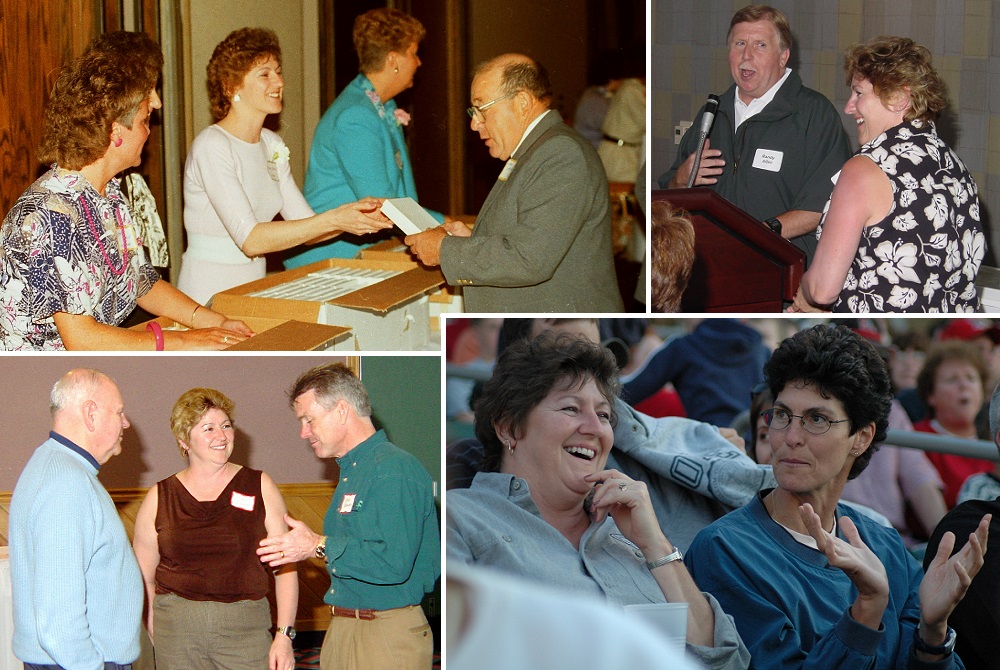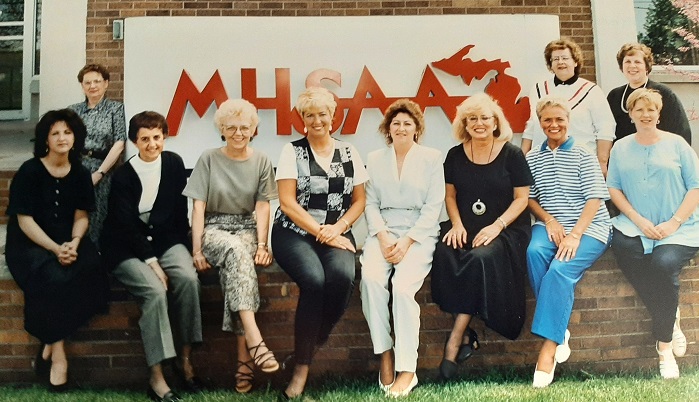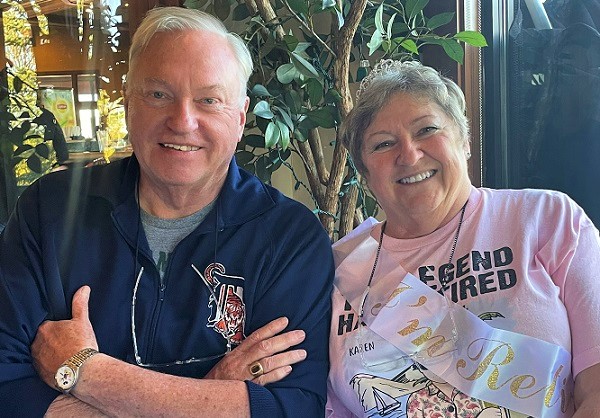
Jackson's Imprint on MHSAA Stretches 45 Years, Across 4 Executive Directors
By
Geoff Kimmerly
MHSAA.com senior editor
October 5, 2022
First impressions can be significant, as many a saying goes. And Karen Brown unknowingly provided one in 1978 that helped affect the course of athletics in this state over the next 40-plus years.
A Michigan State University student named Karen Leinaar had shown up at the Michigan High School Athletic Association for a meeting about a 5K road race she was planning that was unrelated to the MHSAA except that the building provided a good meeting place – and Brown, just a year out of high school, was the first person to greet her at the old Trowbridge Road headquarters.
Seeing someone her age immediately made Leinaar more comfortable. She ended up returning to that office several times over the years, registering as an MHSAA game official while still an MSU student and then starting a career in 1982 that has included nearly 40 years as a high school athletic director and two decades of shaping policy as part of the MHSAA Representative Council.
That’s the kind of impact that’s emanated from Karen Jackson, formerly Brown, and over the last 45 years as assistant to four of the five executive directors during the MHSAA’s 98-year history. Jackson finished that run with her retirement Friday.
“She was always one that would welcome you, and whether you walked into the office or called on the phone, she always had an answer that would calm you down or provide you with the information you needed,” said Leinaar, who currently is serving as interim athletic director at Frankfort High School in addition to her duties as executive director of the Michigan Interscholastic Athletic Administrators Association.
“I remember initially calling and needing something from Mr. Norris – it was always Mr. Norris – and she could answer the question,” Leinaar added, referring to retired MHSAA executive director Vern Norris, who served in that role from 1978-86. “You didn’t want to talk to scary Mr. Norris – Vern was a wonderful man, but he was like the superintendent or principal. Karen always had the answer. … It was always that smile that made you feel like you were more than welcomed, wanted in the office, and everything is going to be OK.”
 Jackson began at the MHSAA in June 1977, two days before her graduation from long ago-closed Harry Hill High School in Lansing.
Jackson began at the MHSAA in June 1977, two days before her graduation from long ago-closed Harry Hill High School in Lansing.
Her high school sports career amounted to about half a season on the Hill varsity volleyball team as a sophomore before she had to switch gears to begin working for the Lansing Regional Chamber of Commerce as part of a school co-op program.
Jackson graduated as a co-valedictorian of Hill’s Class of 1977. Despite her academic standing, she hadn’t received much guidance at school on the possibility of college. But she had a job offer from the Chamber – and also had heard from grade-school friend Deborah Norris (Vern’s daughter) about an opening at the MHSAA.
The MHSAA was offering more money, and Jackson was hoping to buy a car – and so at 18, she became the secretary for executive director Allen W. Bush.
The title has changed over the years, from secretary to the executive director, to executive assistant, to senior executive assistant. The MHSAA’s administrative processes obviously have changed, mostly because of technology, from everything done on paper and through the mail to just about everything conducted digitally over the internet.
But many of Jackson’s most important duties at the end of her tenure resembled those she was hired to carry out nearly half a century ago.
Setting Exemplary Expectations
Bush retired a year after Jackson began, and she then assisted Norris for his eight as executive director. She served with Jack Roberts through his 32 years as executive director from 1986-2018 and then for these first 3½ under current director Mark Uyl.
She was considered the “baby” of the MHSAA staff during her first 12 years, until she turned 30 and her support staff teammates declared she wasn’t the baby anymore during a Christmas party serenade. Just about 33 years later, she’s leaving as one of two people left who worked in the old offices before the MHSAA moved to another East Lansing headquarters at Ramblewood Drive in 1996.
School sports happen thanks to a Karen Jackson or two in every community -- people who provide the unseen support that makes these programs possible every day.
For the last 45 years, she’s provided a consistent anchor for service to 1,500 schools and millions of student-athletes across Michigan.
 “She’s shaped so much of what we’ve done,” said MHSAA assistant director Kathy Vruggink Westdorp, who joined the staff during the 2003-04 school year after more than two decades working for Grand Rapids-area schools. “Her service to schools was imperative to what she was doing, and it was a valuable part for our membership. Hers was such a dedicated service, such an exemplary service – finding solutions, to do what’s needed.”
“She’s shaped so much of what we’ve done,” said MHSAA assistant director Kathy Vruggink Westdorp, who joined the staff during the 2003-04 school year after more than two decades working for Grand Rapids-area schools. “Her service to schools was imperative to what she was doing, and it was a valuable part for our membership. Hers was such a dedicated service, such an exemplary service – finding solutions, to do what’s needed.”
There are file cabinets and libraries and hard drives at the MHSAA office, the contents of which are known by only a handful of people on Earth – and Jackson perhaps the most as she did most of the sorting and maintaining of those files over the years.
For a 1996 Lansing State Journal feature on the MHSAA’s support staff, Jackson (then Yonkers) explained “there are always new challenges, new issues and controversies. It never gets boring. In the past 19 years, we’ve slowly shifted from dealing with athletic administrators, principals and superintendents to dealing with legislators, attorneys and courts.”
The last 25 years has seen much of the work swing back to providing service directly to schools. And Jackson’s mind has become part MHSAA library and part card catalog of where to find those few snippets she might not recall immediately from the last half century.
“I guess what I’m proud of is being able to find things, to know where to find things and how to find things that other people don’t,” Jackson said. “Yes, the technology has changed everything. … We used to have more schools – they used to have 40-some Detroit public schools – and there was a whole era of (litigation), but it’s calmed down now.
“I liked what I did, and it kept me on my toes – that’s for sure.”
The MHSAA is rooted in its responsibilities as a championship and eligibility rules maker, and Jackson was involved in just about every communication in those areas during her time. Tournament changes are made at Representative Council meetings, and she’s reported the minutes for at least 150 of those, including piles of special sessions as the MHSAA managed sports through the COVID-19 pandemic. Eligibility waivers are requested at Executive Committee meetings, and she’s prepared somewhere north of 505 sets of minutes for those monthly sessions even as those agendas have grown in content substantially over the years.
Then there’s all of the correspondence from those four executive directors – all with the initials “kb” or “kj” to go with “AWB” or “VLN” or “JER” and “MU.” She also was in charge of MHSAA election ballots for 35 years, served as the lead organizer of cooperative programs, helped with football tickets for a time and briefly was part of the program-selling crew at early Football Finals at the Pontiac Silverdome.
“I think I’m pretty lucky, being on the Council and Executive Committee, that I’ve been able to work with her a lot. And most athletic directors, they may not even know who she is because they may not have contact with her or do anything with her – but she’s obviously been the unsung hero of that office,” said Vic Michaels, who serves as director of physical education & athletics for the Archdiocese of Detroit and has served on the Representative Council since 2003.
“She just does so much that you don’t really know about, especially with the Council. Whenever I need anything, Karen’s the one I call. She is the history, really. She’s the keeper of that.”
Unprecedented & 'Never to be Replicated'
A longtime co-worker of Jackson, Shirley Hytinen, retired in 1998 after just a few months more than 43 years. She too had worked for four executive directors, as she began in 1955 during the Charles E. Forsythe era.
Jackson surpassed Hytinen’s tenure a few years into Uyl’s, and can readily recall some of what stood out from all four directors she’s assisted.
Bush was “really stern” – he had served in the U.S. Marines – and she said he didn’t smile much until the day he announced his retirement, when it was “like a switch turned. He was smiling and happy and joking around.”
Norris was “the sweetest guy in the world.” Jackson had bought her first house in her mid-20s and was preparing to move in with only her dad and his motor home to assist, when Norris showed up to help at 7:30 a.m. that morning to provide another set of hands.
Roberts is known by Michigan administrators and national colleagues for his writing, and Jackson said jokingly she still “cringes” when she sees a yellow legal pad. She was an important proofreader and spent the majority of her career serving with her desk just a few paces away from that of the recent National Federation Hall of Fame selection, and she attended his induction this past summer and San Antonio.
 Roberts pointed out that during the 1980s, the MHSAA would conduct nine Executive Committee meetings, each averaging fewer than 10 requests for waivers. By the end of his 32 years, there were 11 Executive Committee meetings annually – with approximately 50 waiver requests presented on average. Still, he and Jackson were able to process the meeting minutes and continue to distribute those decisions within 24 hours.
Roberts pointed out that during the 1980s, the MHSAA would conduct nine Executive Committee meetings, each averaging fewer than 10 requests for waivers. By the end of his 32 years, there were 11 Executive Committee meetings annually – with approximately 50 waiver requests presented on average. Still, he and Jackson were able to process the meeting minutes and continue to distribute those decisions within 24 hours.
“Over the more than three decades that Karen and I worked together at the MHSAA, the work became increasingly more voluminous and complicated – and Karen kept finding ways to increase our efficiency and maximize our output,” Roberts said.
Like Norris when Bush was executive director, Uyl had been part of the MHSAA staff under Roberts since 2004 before eventually moving into the corner office. After those first 15 years together, Uyl knew what a valuable person he had just a few yards away to assist in his transition, and “he just says to do this” and allows his staff to run with it, which Jackson enjoyed.
Her duties have been shifted confidently, mostly to Jamie VanDerMoere, another longtime administrative assistant who is best-known to Michigan school sports people for her leadership with the annual wrestling championship tournaments.
Jackson recently was married to Jim Jackson, and they have plans as they close in on their first anniversary – they’re hoping to travel to Italy at some point and also The Masters in Augusta, Ga., next spring. “I’m not going to miss coming to work every day, but the people,” Karen Jackson said.
And many in school sports across Michigan, although they may not realize it, will miss the contributions Jackson has made to their community over the decades including the context she’s provided as thousands of decisions have been made.
“Not only her understanding of our regulations and the processes of our regulations, but understanding why we have those things in place – when someone does something 45 years, you get a lot of historical context,” Uyl said. “What’s made her so effective is understanding the why – and that to me is something that’s almost impossible to replace.
“When an organization has been around 98 years with only five directors, it says something to have worked for four out of the five. That will never be replicated again.”
PHOTOS (Top) From top left, Karen Jackson has been a mainstay of the MHSAA for decades – serving membership, working with administrators like Randy Allen and Gina Mazzolini or serving as assistant to executive directors like Jack Roberts (right) and Vern Norris. (Middle) Jackson, sitting fourth from left, was the “baby” of the MHSAA staff after joining when she was 18. (Below) Jackson and husband Jim have plans to travel in retirement. (MHSAA archives.)

Rep Council Wrap-Up: Spring 2015
May 11, 2015
By Geoff Kimmerly
Second Half editor
The Representative Council of the Michigan High School Athletic Association took a number of significant actions during its annual Spring Meeting, May 3-4, in Glen Arbor, highlighted by changes to out-of-season coaching rules, a call for a member vote on a Constitutional amendment affecting middle school and junior high athletics, and initiatives to promote participant health and safety.
The Spring Meeting of the 19-member legislative body of the Association’s more than 1,400 member schools is generally the busiest of its three sessions each year. The Council considered 13 committee proposals and also dealt with a variety of eligibility rule, postseason tournament and operational issues.
For the past eight months, the MHSAA focused member schools’ attention on an overhaul of out-of-season coaching rules. While support was lacking for a radically different approach, consensus developed for several significant changes within the existing approach for expanding contact between school coaches and their students out-of-season during the school year.
Included in the changes are that coaches will be permitted to work with up to four players in all situations out-of-season during the school year; previously, coaches could work with three or four players, depending on the circumstance. Coaches also will be allowed out of season during the school year to provide coaching in non-school competition to up to four students from that coach’s school. Under this same set of out-of-season coaching rules during the school year, the Council permitted more contact among school coaches and students allowing for previously banned offseason practice rotations to occur. Voluntary workouts out-of-season that involve rotations from conditioning, open gyms, weight lifting and sport-specific skill work may occur so long as there is no more than one four-player station with sport skills being coached.
Following up on more than a year of consideration by the MHSAA Junior High/Middle School Committee and a Junior High/Middle School Task Force created in December 2013, the Council also approved a request for a membership vote to amend the MHSAA Constitution to allow for school membership beginning at the 6th grade. The membership vote is expected to be conducted in late October; if membership approves the amendment, the Council will consider for which sports 6th-graders will be eligible to compete with and against 7th- and 8th- graders.
The MHSAA’s historical concern for health and safety has been intensified during the past six years of an eight-year campaign focused on “4 H’s” – Health Histories, Heads, Heat and Hearts – and the Council approved several initiatives which continue to improve the environment of school-based sports.
The Council authorized up to three pilot programs to be conducted by volunteer schools, aimed at assisting in decision-making regarding the removal of athletes from activity after possible concussion events as well as in reporting and record-keeping of those events.
The Council mandated that member schools report head injury events through a web-based reporting system the MHSAA is developing. The Council also approved the purchase of another level of insurance aimed at assuring that children of uninsured or underinsured families receive prompt and professional care for suspected head injuries. Both the reporting requirement and the insurance protection are for eligible athletes in all levels of all sports, grades 7 through 12, in both practices and competition.
The Council was briefed on an electronic system that could be used to track pre-participation physical examination forms while improving injury reporting and record-keeping; currently, the MHSAA provides paper forms to member schools at no charge. The Council also was updated on MHSAA plans to provide at no cost to every high school in Michigan the ANYONE CAN SAVE A LIFE – Emergency Action Planning Guide, and informed on the MHSAA’s support of the MI HEARTSafe School initiative of the Michigan Department of Health and Human Services, which on May 13 will recognize 128 schools and/or districts for cardiac emergency preparedness.
Here is a summary of other actions taken by the Representative Council at the Spring Meeting, which will take effect during the 2015-16 school year:
Handbook/Administrative Matters
- Participation was expanded by the Council for 9th- and 10th-grade transfer students with no history of high school athletic participation who gain immediate subvarsity eligibility through a waiver by the MHSAA Executive Committee. Students who are granted such a waiver may now participate in designated non-scoring subvarsity heats or non-scoring races of varsity individual contests in sports such as swimming and diving, cross country and track and field. Previous to this action, subvarsity eligibility was permitted in subvarsity team sports only or subvarsity-only meets in individual sports. The subvarsity definition also will apply to international students present in the U.S. on an F-1 Visa but not from an MHSAA-approved international student program.
- Athletes in ice hockey and boys and girls soccer must compete in four regular-season games against other MHSAA schools to be eligible to compete with their school teams in the MHSAA Tournament. This currently is a requirement in alpine skiing, and a waiver procedure similar to what is utilized in skiing will be developed for hockey and soccer as well.
- Non-school sports activities coordinated or directed by administrators and parents were added to situations which trigger an athletic link and an extended period of ineligibility for transfer students if those students then enroll at new schools that have association with those administrators or parents. The Council expanded the athletic-related transfer rule which previously involved only non-school coaches and transferring students who do not make a residential change.
Classification
- The Council created a “life line” allowance for schools to form a cooperative agreement in excess of the 3,500-student enrollment cap in sports sponsored by fewer than 250 schools. A program may be approved by the Executive Committee for up to three years, if during the previous year, the school or the cooperative program in which the school was a part dropped the sport because of a demonstrated lack of participation. Sports sponsored by 250 or fewer schools during 2014-15 were gymnastics, ice hockey, boys and girls lacrosse, boys and girls alpine skiing and boys and girls swimming and diving. This three-year “life line” allowance is similar to the regulation which allows for a “startup” cooperative program to be created among schools whose combined enrollment exceeds 3,500 students but the schools involved did not sponsor the sport in the previous school year.
Sport Matters
- For boys and girls basketball, the Council approved an MHSAA Basketball Committee recommendation to seek permission from the National Federation of State High School Associations (NFHS) to allow teams to play up to two regular-season games made up of 18-minute halves instead of the current 8-minute quarters. If permission is granted by the NFHS, schools will be required to seek permission from the MHSAA prior to events and provide reports after 36-minute games are played.
- In bowling, it was announced that Kegel is developing a bowling lane oil pattern for high school bowling called the “Allen Pattern,” named after former MHSAA Assistant Director Randy Allen, who administered the MHSAA bowling program from its inception during the 2003-04 school year until retirement in 2013. Michigan has the largest number of schools in the U.S. sponsoring interscholastic bowling. The Allen Pattern is being designed specifically for the high school level and will be utilized for the 2016 MHSAA Bowling Tournament.
- In cross country, the MHSAA will appoint and administer a task force of coaches and athletic administrators to address unbalanced Lower Peninsula Cross Country Regionals – including some Regionals having more complete teams in competition than others because teams decide to not compete or cannot compete with a full lineup after Regional groups are drawn. The task force will present its findings to the Council in 2016.
- For ice hockey, four-person officiating crews were approved for Quarterfinals. The MHSAA began using four-person crews for Semifinals and Finals in 2014.
- In boys lacrosse, a “play in” game was approved for teams seeded 9-16 in each Regional. Play-in games will be played three days earlier than the traditional start of the MHSAA Tournament, with winners then playing teams seeded 5-8 at the traditional start of tournament play.
- In wrestling, the Council approved a recommendation by the MHSAA Wrestling Committee that eliminates the second weigh-in at the MHSAA Team Finals. The Friday weigh-in before the start of Quarterfinals will be used for all three rounds of competition during Finals weekend.
The Council also reviewed reports on membership, with 754 senior high schools and 703 junior high/middle schools in 2014-15; eligibility advancement applications, which totaled four for the year; the use of Educational Transfer Forms, which held steady this year; school violations, attendance at athletic director in-service workshops and Coaches Advancement Program sessions, officials’ registrations, rules meetings attendance and officials reports submitted for the past three sports seasons. The Association’s $10.4 million budget for the 2015-16 school year also was approved.
The Representative Council is the 19-member legislative body of the MHSAA. All but five are elected by member schools. Four members are appointed by the Council to facilitate representation of females and minorities, and the 19th position is occupied by the Superintendent of Public Instruction or designee.
The MHSAA is a private, not-for-profit corporation of voluntary membership by more than 1,400 public and private senior high schools and junior high/middle schools which exists to develop common rules for athletic eligibility and competition. No government funds or tax dollars support the MHSAA, which was the first such association nationally to not accept membership dues or tournament entry fees from schools. Member schools which enforce these rules are permitted to participate in MHSAA tournaments, which attract more than 1.4 million spectators each year.

